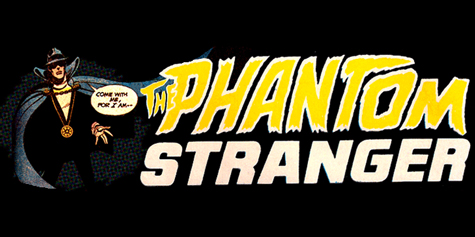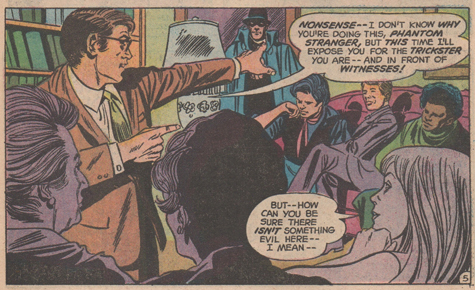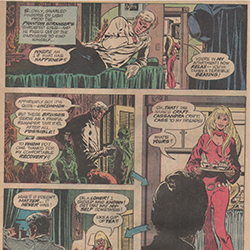
Ask me my favorite superhero—that's easy. The one character whose comics I want to be buried with; the guy I would dress as at Comicon, were I to be so lame; the hero whose powers I would most want to have: the Phantom Stranger. No question.
Part of the appeal is that the Phantom Stranger isn't 100% a superhero. He's not fully anything. He's a member of the Justice League, who only barely qualifies as a costumed crime fighter—he's as much a part of the wave of horror and supernatural comics that DC published in the late sixties and early seventies. He has mystical powers, yet he wears a fedora and a turtleneck. And in his comic series, he's as much a narrator as a player.
If he ever needed a new alias, the Stranger could go with the Preluder, or Exposition Man. Like Rod Serling, he often sets the stage for eerie tales in which ancient curses teach people hard lessons. Then, he appears in the very stories he introduced, warning the characters that the time for changing their evil ways is growing short.
It's never really clear what the Stranger's powers are exactly, and official word from DC isn't that his origin is unknown, but that he has several origins, all conflicting and all, more or less, canonical.
Two involve angels, one involves Christ, and one has the Stranger as a time traveler being reconstructed in the energies of the Big Bang. He is a one-man multiverse, in a comic book cosmos that already has several multiverses: presumably, the sum totality of each universe's iteration of the Phantom Stranger is equal to the scale of the DC multiverse itself.
Another odd thing about the Phantom Stranger is that his series never seem to work. Early on, back when he wore a trench coat and necktie, he was a shadowy dude, who seemed to have his finger on the pulse of some heavy mystical shit. He shared his adventures with Dr. Terrence Thirteen, aka the Ghost-Breaker (who ya gonna call?)—a comic book version of the Amazing Randi, absolutely certain that the Stranger was a charlatan and a conman in need of merciless unmasking. This humorless dance between the otherworldly Stranger and a guy who was never going to buy his shit seemed to grow tiresome, even for the readers (the Stranger was pretty fed up by their first meeting), and Dr. Thirteen dropped out of the series early on, reappearing in occasional backup stories where, at last, he exposed supernatural scams as all too natural.

By the time the Phantom Stranger/Dr. Thirteen contretemps were getting stale, the writers had added a group of paranormal investigator teens, who must have been inspired by Scooby Doo. An arch villain had also reared her lovely head, Tala—a kind of evil spirit, whose look presaged Elvira, Mistress of the Dark. She, too, went away, traded in for someone a little more solid—a mortality-obsessed modern mage called Tannarak, who, in the spirit of supervillainy, at one point, started wearing a perplexing green outfit with tights and a matching cape.
 Continuing to throw spaghetti at the wall only to watch it slide to the floor, the writers gave our hero a girlfriend, the blind mystic Cassandra Craft, whose wardrobe seemed to consist of a single magenta pantsuit and a medallion belt.
Continuing to throw spaghetti at the wall only to watch it slide to the floor, the writers gave our hero a girlfriend, the blind mystic Cassandra Craft, whose wardrobe seemed to consist of a single magenta pantsuit and a medallion belt.
Heaping specifics onto a character so completely removed from our familiar world was never a good idea. The stories improved when they shifted from the battling-wizards tales to Twilight Zone-esque slices of the uncanny and glimpses into the other side.
A useless mini-series in the 80s and a reboot during DC's New 52 campaign, that started out promising but fizzled, only proved the futility of writing the Stranger as a protagonist. The stories that worked best were the ones where he was not the hero.
And here's where the Stranger's strengths lie. He's not an adventurer, but a story element. In the awful mini-series Legends (the comic which, by the way, gave us the soon-to-be-immortalized-in-film Suicide Squad), the Phantom Stranger took the pro-hero side of a cosmic debate between himself and the evil demigod Darkseid—a debate that played out among the living on earth. And, on an episode of the cartoon Batman: The Brave and the Bold, the Stranger is the side of forgiveness and reconciliation in a similar debate with the Spectre (speaking for harsh, uncaring retribution) about the routes Batman could take to redress his parents' killings.
The Stranger's vagueness has served him well; he keeps coming back and proving what he's made of, without ever verifying exactly what that is. Unlike other characters whose histories get tossed aside with each reboot, the Stranger's breaks with continuity, every time a new series starts up, aren't jarring. He never belonged to a continuity. And, while he's never been the most satisfying four-color adventurer, he offers storytelling possibilities that other heroes, even those who jump between realities like Animal Man, the Swamp Thing, and the Flash, can't quite reach.
The Stranger would come to preside over a collection of DC’s oddest, eeriest heroes, and his comic would become the place to find other ultra-mysterious do-gooders. One of the most mysterious—someone who was even more of a cypher than the Phantom Stranger—would take up residency as a backup feature in later issues of the Stranger’s 70s series, and we shall turn our gaze on her next.
Check back next week as we highlight another DC superweirdo—Black Orchid!
Hector DeJean can frequently be found in comic stores, bookshops, and the Eighties. His serialized story of a private detective who only solves food-related crimes is no longer online.


I’ve been a fan of PS for years, and I think you made an excellent point about his being a story element. But, he is more than just a narrator, he is is also catalyst who often causes changes to the likely paths the other characters follow.
The best way to understand what he does is to recognize him as “cosmic conscience”; the little voice in all of us which distinguishes right from wrong. He is the type of character who would not really try to defeat a supervillian as to try and convince the supervillian to stop being a supervillian. That, in my view is what makes him unique.